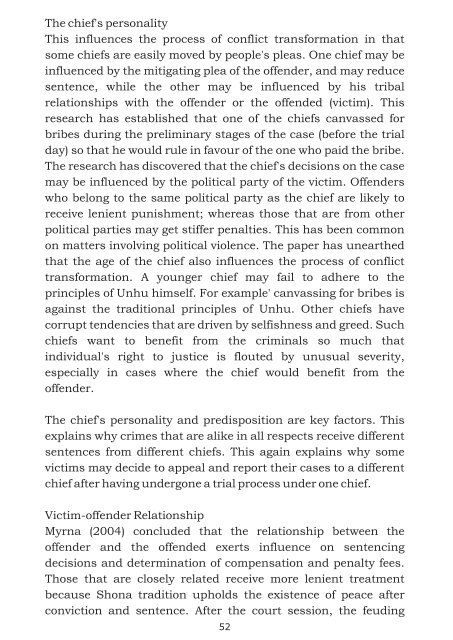Beneficiaries are actors too.pdf - Southern Institute of Peace ...
Beneficiaries are actors too.pdf - Southern Institute of Peace ...
Beneficiaries are actors too.pdf - Southern Institute of Peace ...
Create successful ePaper yourself
Turn your PDF publications into a flip-book with our unique Google optimized e-Paper software.
The chief's personality<br />
This influences the process <strong>of</strong> conflict transformation in that<br />
some chiefs <strong>are</strong> easily moved by people's pleas. One chief may be<br />
influenced by the mitigating plea <strong>of</strong> the <strong>of</strong>fender, and may reduce<br />
sentence, while the other may be influenced by his tribal<br />
relationships with the <strong>of</strong>fender or the <strong>of</strong>fended (victim). This<br />
research has established that one <strong>of</strong> the chiefs canvassed for<br />
bribes during the preliminary stages <strong>of</strong> the case (before the trial<br />
day) so that he would rule in favour <strong>of</strong> the one who paid the bribe.<br />
The research has discovered that the chief's decisions on the case<br />
may be influenced by the political party <strong>of</strong> the victim. Offenders<br />
who belong to the same political party as the chief <strong>are</strong> likely to<br />
receive lenient punishment; whereas those that <strong>are</strong> from other<br />
political parties may get stiffer penalties. This has been common<br />
on matters involving political violence. The paper has unearthed<br />
that the age <strong>of</strong> the chief also influences the process <strong>of</strong> conflict<br />
transformation. A younger chief may fail to adhere to the<br />
principles <strong>of</strong> Unhu himself. For example' canvassing for bribes is<br />
against the traditional principles <strong>of</strong> Unhu. Other chiefs have<br />
corrupt tendencies that <strong>are</strong> driven by selfishness and greed. Such<br />
chiefs want to benefit from the criminals so much that<br />
individual's right to justice is flouted by unusual severity,<br />
especially in cases where the chief would benefit from the<br />
<strong>of</strong>fender.<br />
The chief's personality and predisposition <strong>are</strong> key f<strong>actors</strong>. This<br />
explains why crimes that <strong>are</strong> alike in all respects receive different<br />
sentences from different chiefs. This again explains why some<br />
victims may decide to appeal and report their cases to a different<br />
chief after having undergone a trial process under one chief.<br />
Victim-<strong>of</strong>fender Relationship<br />
Myrna (2004) concluded that the relationship between the<br />
<strong>of</strong>fender and the <strong>of</strong>fended exerts influence on sentencing<br />
decisions and determination <strong>of</strong> compensation and penalty fees.<br />
Those that <strong>are</strong> closely related receive more lenient treatment<br />
because Shona tradition upholds the existence <strong>of</strong> peace after<br />
conviction and sentence. After the court session, the feuding<br />
52


